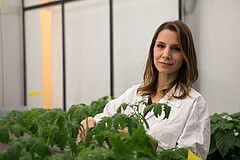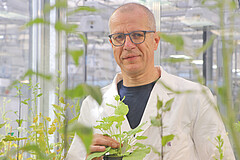Excellence Strategy:
University of Hohenheim scores highly in the awarding of Clusters of Excellence [22.05.25]
Joint “GreenRobust” Cluster of Excellence at the Universities of Hohenheim, Tübingen, and Heidelberg researches the adaptability of plants to extremes
Participation in two Clusters of Excellence: This is the University of Hohenheim’s assessment at today’s announcement of the results of the Excellence Strategy of the federal and state governments. “GreenRobust” is a joint cluster with the universities of Tübingen and Heidelberg. It is dedicated to the question of how plants can remain functional despite environmental stress and how agricultural productivity can be maintained in the face of climate change and the increasing threat of pests. The University of Hohenheim is involved in “TERRA,” a cluster of the University of Tübingen, with researchers and important infrastructure. It investigates how different soil types and biodiversity can influence and strengthen each other. The Stuttgart cluster IntCDC, including expertise from Hohenheim in the economic and social sciences, has been extended.
Well-deserved reward for a strong partnership: “GreenRobust is a wonderful example of how modern research can be conceived and realized. All participants contribute both individual strengths and a unique research infrastructure, resulting in unique expertise and a high concentration of leading plant researchers," says the President of the University of Tübingen, Dr. Dr. h.c. (Dōshisha) Karla Pollmann.
“We are delighted that the longstanding collaboration of our scientists has now been raised to the next level with GreenRobust. The Cluster of Excellence addresses the question of how plants, crop plants in particular, can survive in a changing environment. This is not only a highly ambitious research project in scientific terms, it is also hugely relevant for our world,“ comments Prof. Dr. Frauke Melchior, President of the University of Heidelberg.
“With the GreenRobust Cluster of Excellence, the Universities of Tübingen, Heidelberg, and Hohenheim are embarking on a new journey together and deepening their long-standing friendship. The aim of this journey is to gain new insights into how we can preserve our ecosystems in times of climate change and secure our food supply in the future," adds Prof. Dr. Julia Fritz-Steuber, Vice President for Research at the University of Hohenheim.
Prof. Dr. Fritz-Steuber considers the research objectives of the TERRA Cluster of Excellence to be similarly important. “With TERRA, the University of Tübingen is making an important contribution to biodiversity research and species conservation. As the University of Hohenheim, we are proud to support them with three departments.”
Unique infrastructure is created for unique research
A unique research infrastructure is being set up at the University of Hohenheim for the planned research. This includes, for example
- The “Diversitorium,” an open-air facility with four different soil variants that are heated underground and artificially irrigated. The interfaces between different soil types are of particular interest. Different heat and water supplies make it possible to simulate a variety of different soil scenarios with different communities of plant species in order to study their influence on the plant world.
- The mobile “Xerodrom” at the agricultural experiment station. It enables researchers to realistically simulate extreme situations such as drought and drought stress in the field, regardless of the weather.
In addition to field experiments, the Clusters of Excellence focus on laboratory work and data analysis using network theory and artificial intelligence.
New professorships and a cross-faculty doctoral study program
Reinforcement the GreenRobust and TERRA teams will be strengthened by three new professorships. We are looking for three specialists for
- Eco-Evolutionary Theory (W1)
- Biodiversity Theory (W3)
- Remote Sensing of the Biosphere (W3)
This fall, the University of Hohenheim is launching a new cross-faculty doctoral study program in agricultural and natural sciences. The new Hohenheim Graduate School of Life Sciences offers doctoral candidates from both faculties additional courses in science management, communication, didactics, and languages. This is supplemented by active participation and collaboration in an annual retreat and an international conference to promote networking and scientific discourse.
BACKGROUND: GreenRobust
Plants prove to be surprisingly resilient. They have survival strategies in the event of drought, pest infestation, or climate change. This so-called robustness is at the heart of the “GreenRobust” research project. The researchers are investigating what happens at the molecular level, how entire plant communities react, and what role biodiversity plays in this. With the help of large data sets from experiments in the laboratory, research greenhouse, and experimental stations, they use network theory and artificial intelligence to develop knowledge-based strategies that help preserve natural ecosystems and ensure agricultural productivity.
The spokesperson of the team is Prof. Dr. Rosa Lozano-Durán from the Center for Plant Molecular Biology at the University of Tübingen. Co-spokespersons are Prof. Dr. Karl Schmid from the Institute of Plant Breeding, Seed Research and Population Genetics at the University of Hohenheim and Prof. Dr. Thomas Greb from the Centre for Organismal Studies at the University of Heidelberg.
For details see “GreenRobust profile” and the future website https://greenrobust.de/
BACKGROUND: TERRA
Vital resources such as drinking water and the air that we breathe are created by interactions between the Earth’s geosphere and its biosphere. Understanding these interactions in detail is therefore essential for the well-being of humankind. The current human impact on ecosystems is unprecedented, but the underlying laws of nature always apply. The TERRA Cluster of Excellence will investigate how geo-biosphere interactions both respond to and influence environmental change. TERRA tests the hypothesis of whether the geosphere’s diversity stabilizes the biosphere and, vice versa, whether the biosphere’s diversity stabilizes the geosphere – and asks: If this is the case, how?
TERRA’s representatives are Professors Michaela Dippold, Kira Rehfeld and Olaf Cirpka, all of whom teach and conduct their research at the University of Tübingen’s Environmental and Geoscience Center (GUZ). The Cluster of Excellence of the University of Tübingen includes researchers from the University of Hohenheim and the Senckenberg Society for Nature Research in Frankfurt.
Text: Klebs








